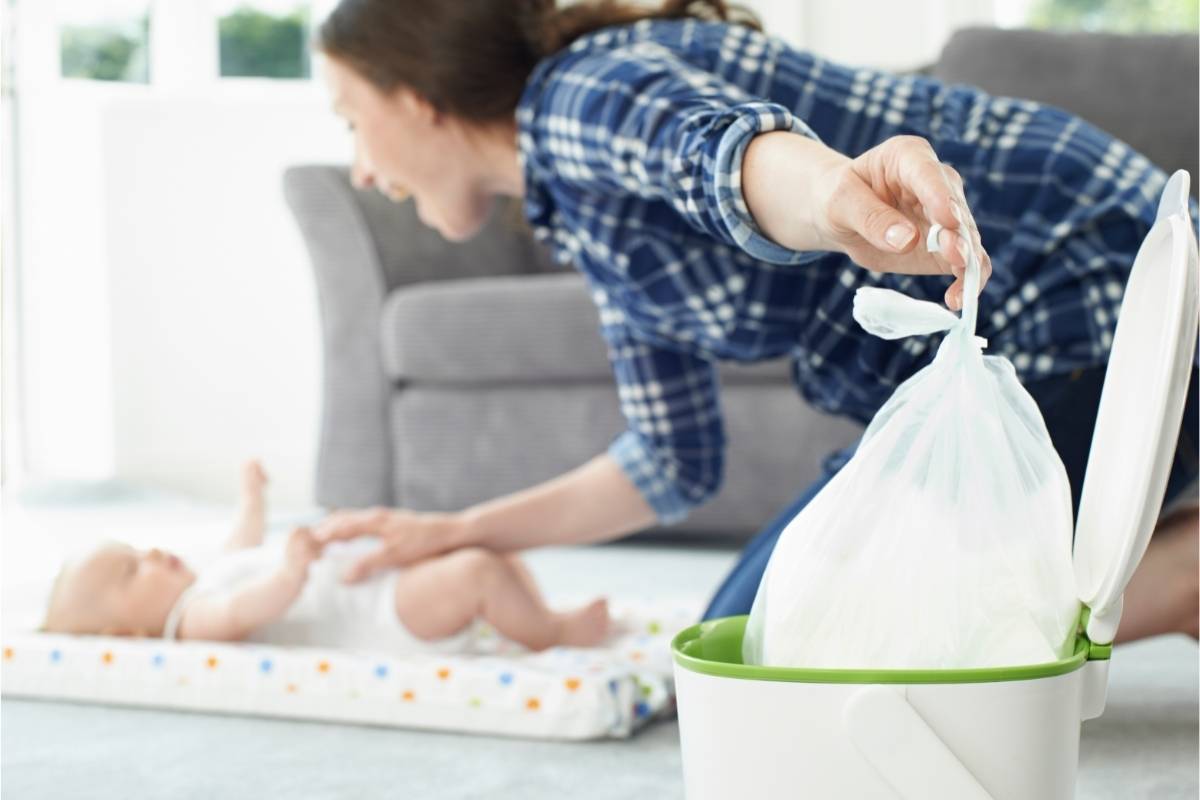Cuddles and that sweet baby smell are not all that comes with babies. There is an unlimited amount of poop and fountain pee to deal with. Nappy bins are a convenient way to store dirty nappies before you finally dispose of them, but do they also keep the stench at bay?
Nappy bins are uniquely designed to detain odors from all kinds of nappies, and they do not smell. This makes them different from normal bins. Exceptions occur with inappropriate use or management.
This article explores nappy bins, including how they work and whether they smell. Also covered will be how to stop nappy bins from smelling, how to clean them, and what you should look for before buying one.

How Do Nappy Bins Work?
Along with heart-stopping gurgles, unending diaper changes and sleepless nights are in the welcome basket of parenthood. You have the freedom to choose between reusable nappies or disposable nappies.
If you take the disposable nappy route, a nappy bin will fast become your trusted companion. They temporarily tuck away soiled nappies. It may be inconvenient to hunt for your kitchen or outdoor bin with every diaper change.
With a nappy bin, you only need to wrap the used nappy, open the lid, dump the nappy in it, and forget about it until you have another dirty nappy to dispose of. You may use it 9 to 12 times daily for infants and 6 to 8 times for older babies.
Out of sight shouldn’t be out of mind. You should empty your nappy bin at least 3 times a week. While nappy bins have a capacity of 28 to 55 nappies per unit, do not wait to hit the maximum number before taking care of the dirty nappies.
Every brand comes with a unique design and the odor-preventing component is also different. Some are made of steel, which is not porous and keeps smells inside, others have an in-built deodorizing container.
Benefits Of Using A Nappy Bin
Although they are usually used for disposable nappies, they can also store dry, reusable nappies until you throw them in the machine for wash day. The odor protection is only one advantage of a nappy bin. Other benefits are:
- Timesaving
You may think it takes only a few minutes to run to the outdoor bin and you do not need a nappy bin. But those few minutes eventually consume a sizable part of your day after 6 to 10 trips.
With all the things you have to do in caring for your baby, every second of your 24 hours becomes valuable. Nappy bins help to make nappy changes more efficient.
- Convenient
One nappy bin in your baby’s room or your bathroom is convenient for a quick drop-off for dirty nappies. They also cut outdoor trips in unpleasant weather and save you many trips on the stairs, if you have them in your home.
- Easy to use
You can use many nappy bins with one hand. Some of them even come with a foot pedal, so all you have to do with your hands is hold your baby and dump the nappy.
- Hygienic
Some nappy bins come with antibacterial lining/lining bags that prevent the growth of bacteria. Once you throw the nappy in it, you don’t have to come in contact with it anymore. They keep your nursery neat and organized.
Nappy bins fit well into whatever space you put them in, and they are relatively safe. As long as you keep them away from the curious hands of toddlers, you will be happy with how they simplify your life.
Do Nappy Bins Smell?
Dirty nappies stink and without proper disposal, the stench can permeate the environment you throw them into. Whether the nappy is just wet or it has poop in it, the odor is not what you want to linger long after you have disposed of it.
Nappy bins hide the odors and keep your room free from immediate and lingering smells. They are not supposed to smell. Regardless, improper handling/use will cause them to smell.
For example, if you need to push the nappy for the disposable bag to seal it, just dropping it will prevent proper sealing. Exposed and smelly nappies will eventually make their presence known.
How To Stop Nappy Bins From Smelling
An accumulation of dirty nappies far beyond the maximum capacity of a nappy bin will destabilize any odor trapping feature it has. Some parents have also complained of an increasing stench with prolonged use. This is independent of consistent cleaning or emptying.
If your nappy bin smells, here are some methods and materials you can use to stop the smell:
- Before disposing of dirty nappies, remove poop and dump it in the toilet. This ensures the safe disposal of poop and also reduces the growth of bacteria that causes the smell.
- Use a deodorizer. It could be a deodorizing spray you can apply to a nappy before putting it in the bin. Bin fresheners (pellets or powders) can also be placed at the bottom of the nappy bin before use.
- Odor controlling bags can be used, besides whatever liners the nappy bin comes with. Doggy poop bags that seal odors are a good option. This will provide double protection against the nappy odor.
- Place bamboo charcoal at the bottom of the bin. The small pores on the bamboo charcoal absorb moisture, odor, and even chemicals like ammonia (produced from urine.) The charcoal can be composted/recycled, and it lasts for about a year.
- Baking soda and washing powder can absorb and mask smells. After washing and drying, pour 2 to 3 tablespoons of washing powder at the bottom of the bin to mask smells. You can also sprinkle baking soda in the bin before use, and with every nappy disposal.
- Essential oils like tea tree oil, eucalyptus, and lavender are efficient in taking care of smells. You can drench a cotton ball in the oil and tape it to the cover or side of the nappy bin.
An easier approach would be to cut an unused sanitary towel or liner into strips, pour some drops of the oil on it, and stick it inside the bin (lid or sides.)
- Wash, disinfect, and properly clean your nappy bin every time you empty it. Antibacterial soaps, wipes, and sprays can be used to clear germs and leave a fresh smell.
Remember to empty your nappy bin long before it reaches its maximum capacity.
How Do You Clean A Nappy Bin?
Regular cleaning of your nappy bin cannot be overemphasized. It is the first line of defense against unwanted smells. It is easy to clean every time you empty the bin, instead of waiting for it to get “dirty” before cleaning it.
Here is how to clean a nappy bin:
- The first thing to do is wear gloves to prevent direct exposure to any germs. Your normal cleaning gloves will do.
- Empty the bin of all dirty nappies and remove the lining dispenser and cartridge, if it has one.
- Place the bin where you can wash it freely. It may be out in the yard or the bathroom.
- Using hot water from the showerhead or garden hose, rinse the interior and exterior of the bin.
- Pour any washing liquid of your choice in the bin and sprinkle it with baking soda. Allow the mixture to sit for about 4 minutes before the next step.
- Using a sponge or cleaning towel, wash within and outside the bin. Rinse it properly, preferably with hot water.
- You can apply some vinegar or borax on the inside of the bin to prevent the development of mildew and mold.
- Allow the bin to get dry before use.
When it is completely dry, you can place the essential oil-infused material.
Before You Buy A Nappy Bin
There are a good number of nappy bins available in the market, with eye-catching designs and distinctive features. They can be pricey too. To get your money’s worth, look out for these:
- Safety
The nappy bin should be childproof. Get a bin that has a lock, or a lid tailored for adult use.
- Liners
A bin that has an in-built liner system will be very convenient. The bins that come in this design have the liners rolled in a special cassette that can be replaced when you run out.
- Size and capacity
You want a bin that is big enough to hold a sufficient amount of nappies without overcrowding your space.
- Odor sealing
The attraction of a nappy bin is that it traps/seals in odors. Get one that has an excellent mechanism to trap odors to save you the stress of using extra measures to dispel odors.
The costs of being a parent can quickly add up, especially when you want the utmost convenience. If using a nappy bin is overkill for you, you can use a normal bin with odor-preventing bags or sprays. What is important is that you hygienically handle dirty nappies.

